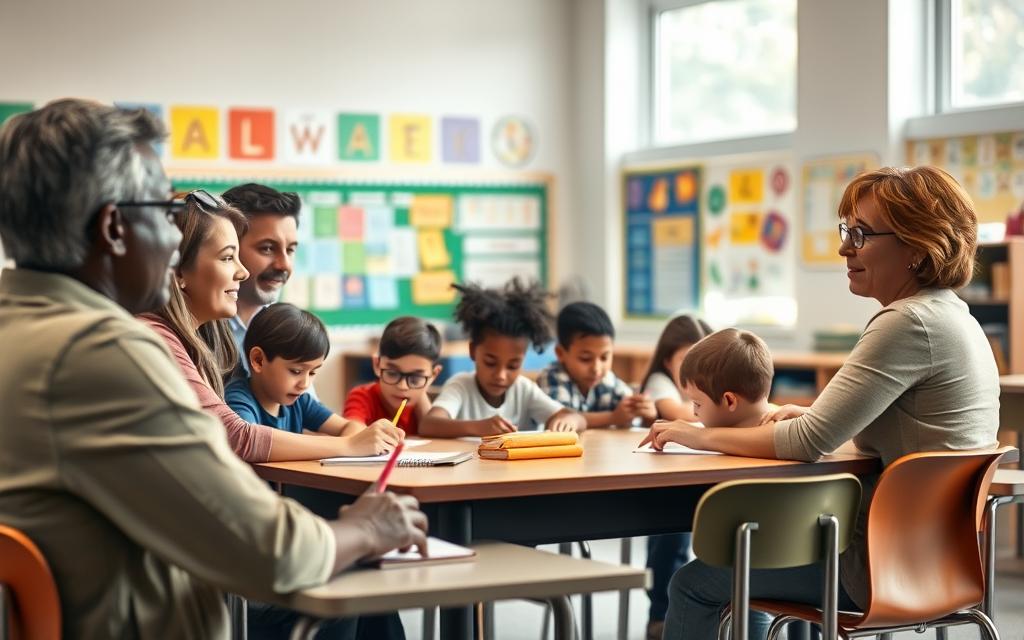adversiment
The success of students in school is greatly influenced by parent engagement in schools. Studies have found that when parents get involved, students do better and enjoy learning more.
Parents are key in helping their kids succeed in school. They can support learning at home and join in school events. This help can be in many ways, like helping with homework or going to parent-teacher meetings. Together, parents, teachers, and leaders can create a supportive learning space that helps students succeed.
Effective parent engagement is key for students to do well. This article will look at how parental involvement in education helps students achieve their goals.
Understanding Parental Involvement in Education
It’s key to grasp the role of parents in education. Parental involvement is more than just attending school meetings. It’s about a wide range of activities that help students do well in school and grow as individuals.
Definitions and Concepts
Parental involvement means parents taking part in their child’s learning journey. This includes helping with homework, going to school events, and talking about their child’s progress. It’s important for a good learning environment at home. A study shows that when parents get involved, students do better in school.
Importance of Parental Roles
Parents’ roles are very important. When parents are involved, their children do better in school and develop social skills. School community partnerships help by bringing parents, teachers, and the community together.
“The partnership between parents and educators is a powerful force that can transform the educational experience for students.”
By understanding their roles, parents can offer the support and encouragement students need to succeed.
Benefits of Parental Involvement
Parental involvement in education has many benefits. It affects a child’s learning, social skills, and motivation. When parents get involved, their child’s school work improves. They also learn better social skills and become more motivated to learn.
Improved Academic Performance
Research shows that parental involvement boosts academic performance. Parents help with homework and projects. They make sure their kids stay on track with their schoolwork. This leads to better grades and a more positive view of school.
A study found that kids with involved parents do better in school. They have higher grades than kids whose parents are not as involved.
Enhanced Social Skills
Parental involvement also helps kids develop better social skills. When parents join in school activities, it creates a sense of community. This helps kids interact better with others. They learn important skills like teamwork, communication, and how to solve problems.
Increased Motivation and Engagement
Lastly, parental involvement boosts motivation and engagement. When kids see their parents interested in their studies, they are more motivated. This motivation leads to better school performance and a more positive educational experience.
| Benefits | Description | Impact |
|---|---|---|
| Improved Academic Performance | Additional support with homework and projects | Better grades and positive attitude |
| Enhanced Social Skills | Participation in school activities and events | Better social interactions and life skills |
| Increased Motivation and Engagement | Parents showing interest in studies | Higher motivation and engagement |
Different Forms of Parental Involvement
Parents can help their child’s education in many ways. They can volunteer at school or support learning at home. This approach boosts the child’s grades and strengthens family and school ties.
Volunteering at School
Volunteering at school lets parents get involved in their child’s learning place. They can help in classrooms, at events, or in parent groups. This not only helps the school but also gives parents a peek into their child’s day.
Benefits of Volunteering include learning about the school’s plans and policies. It also helps build friendships with teachers and other parents. Plus, it makes the school a better place for everyone.
Supporting Learning at Home
Helping with homework and creating a study space at home is key. It boosts the child’s grades and keeps them excited about learning. Parents play a big role in their child’s success.
Effective Strategies include setting a study schedule, providing study materials, and showing interest in schoolwork. This makes learning fun and engaging.
Communication with Teachers
Talking to teachers is crucial for knowing how a child is doing. It helps solve problems and makes sure parents and teachers are on the same page. Regular updates keep parents in the loop.
Parents can stay connected by going to parent-teacher meetings, using school apps, and reaching out to teachers. This keeps everyone informed and working together.
| Form of Involvement | Description | Benefits |
|---|---|---|
| Volunteering at School | Helping in classrooms, school events, or PTOs | Builds relationships, supports school operations |
| Supporting Learning at Home | Creating a learning environment, helping with homework | Improves academic performance, motivates child |
| Communication with Teachers | Regular updates, parent-teacher conferences | Keeps parents informed, addresses issues promptly |
Barriers to Parental Involvement
The journey to get parents involved in their child’s education is full of obstacles. It’s important to know these challenges to find ways to overcome them. This way, every parent can play a role in their child’s learning.
Time Constraints
Time is a big problem for many parents. They work long hours or have jobs on top of each other. This leaves them little time for their child’s school work. Flexible scheduling and virtual involvement opportunities can help solve this issue.
Lack of Resources or Knowledge
Some parents don’t have the tools or know-how to help their kids with school. They might not have the right materials or know how to help with homework. Schools can help by offering resources and workshops for parents.
Cultural and Language Barriers
Cultural and language differences can also make it hard for parents to get involved. Parents who don’t speak the school’s language or come from different cultures might feel left out. Schools can help by offering multilingual support and programs that respect different cultures.
| Barrier | Description | Potential Solution |
|---|---|---|
| Time Constraints | Limited time due to work or other commitments | Flexible scheduling, virtual involvement |
| Lack of Resources or Knowledge | Insufficient access to educational materials or understanding of how to support education | Provision of resources, parental workshops |
| Cultural and Language Barriers | Difficulty participating due to language or cultural differences | Multilingual support, culturally sensitive programs |
By tackling these obstacles, schools and communities can work together. This teamwork can help increase caregiver involvement in education and boost promoting family engagement. Together, they can support students better and improve learning results.
Best Practices for Effective Parental Involvement
Effective parental involvement in schools is key. It makes learning better for everyone. Schools need to work together with parents and teachers. This means being supportive, setting goals, and giving the right tools.
Creating a Collaborative Environment
A good team effort is the base of parental involvement. It’s about fostering open communication among all. Schools can do this by having meetings, using digital tools, and listening to feedback.
“When parents and teachers work together, it creates a powerful partnership that can significantly impact a child’s educational success.”
Community events are also great. They bring parents, students, and staff together. This helps build strong relationships and understand everyone’s needs.
Setting Realistic Expectations
It’s important to have clear goals and expectations. Schools should tell parents what they aim to do. This makes sure parents know what to do to help.
- Clearly define the goals of parental involvement programs.
- Communicate effectively with parents about their roles.
- Establish measurable outcomes to assess the effectiveness of involvement strategies.
Providing Resources for Parents
Helping parents get involved is crucial. Schools can offer workshops, online help, and personal meetings with teachers.
| Resource Type | Description | Benefits |
|---|---|---|
| Workshops | Hands-on sessions for parents to learn new skills. | Enhances parental engagement and confidence. |
| Online Materials | Digital resources such as guides and videos. | Provides accessible information at any time. |
| One-on-One Consultations | Personalized meetings with teachers. | Addresses specific concerns and needs. |

In conclusion, making schools better for everyone is key. By working together, setting clear goals, and helping parents, schools can create a positive learning environment for all.
The Role of Schools in Encouraging Involvement
Schools play a big role in making parental involvement work. By making parents feel welcome, schools can really boost engagement. This helps students and brings the school community closer together.
Communication Strategies
Communication is crucial for any parental involvement program. Schools can use newsletters, emails, and online platforms to keep parents in the loop. It’s important for parents to have the info they need to help their kids.
Using many ways to talk to parents is smart. Schools can translate important stuff into different languages. This shows they care about everyone and want to include all families.
Community Events and Workshops
Hosting community events and workshops is a great idea. These events help parents meet teachers and other parents. Workshops can cover topics like how to help with homework or understanding the curriculum.
These events educate parents and give them a chance to share their thoughts. This teamwork strengthens the school community. It also helps schools learn what parents think, which is useful for future plans.
Case Studies: Successful Parental Involvement Programs
Many top schools have launched successful parental involvement programs. These efforts have shown great results. They offer insights into the best ways to boost family involvement in student success and parental support in academics.
Examples from Top Schools
Top schools show that involving parents can greatly help students. They use various methods, like volunteer programs. These allow parents to help in classrooms, at school events, and in making decisions.
“When parents are involved, students tend to have higher grades, better attendance, and higher graduation rates.”
One school’s program is a great example. It included regular meetings, workshops, and volunteer chances. This led to better grades and behavior in students.
Outcomes of Effective Programs
Effective parental involvement programs have many benefits. They can make students perform better in school, stay motivated, and improve their social skills.
| Outcome | Description | Impact |
|---|---|---|
| Improved Academic Performance | Students show better grades and test scores | Higher academic achievement |
| Increased Student Motivation | Students are more engaged in learning | Better attendance and lower dropout rates |
| Better Social Skills | Students develop improved social and emotional skills | Enhanced interpersonal relationships |
Looking at these examples, educators and policymakers can find the best ways to support family involvement in student success and parental support in academics. This can lead to better results in education.
Technology and Parental Involvement
Technology has changed how parents get involved in their kids’ education. It has made it easier for parents to keep up with their child’s school life. This is thanks to digital tools in schools.
Online platforms have made talking to teachers easier. Parents can get updates on their child’s grades and talk to teachers online. They can even join virtual meetings with teachers.
Online Tools for Communication
Many online tools help parents and teachers talk more easily. Some top ones are:
- Parent-teacher conference scheduling software
- Mobile apps for sharing student progress and school news
- Email and messaging platforms for direct talks
These tools make communication better and keep a record of talks. This helps track how a student is doing over time.
Virtual Engagement Methods
Virtual ways to get involved have changed school activities. Parents can now join school events and meetings online. They can even help out in classrooms from home.
Some examples of virtual involvement are:
- Virtual parent-teacher organization meetings
- Online volunteer chances
- Webinars on school topics
These methods help parents who can’t make it to school in person. This includes those with busy lives or who live far away.
Technology helps schools be more open and team up with parents. It makes sure all parents can help with their child’s learning.
The Impact of COVID-19 on Parental Involvement
The COVID-19 pandemic changed how parents are involved in schools. Schools moved to online learning, making parents key players in their kids’ education. They faced new challenges and found new ways to help.
Shifts in Parental Roles
Parents had to take on more roles during the pandemic. They became more involved in their kids’ learning. This was because they needed to help their kids with online school.
Increased responsibility was a big part of this change. Parents had to manage work, home tasks, and help with school. This made them more aware of what their kids were learning.
Lessons Learned for Future Engagement
The pandemic taught us a lot about improving parental involvement. One key lesson is the need for flexibility and adaptability in education. Schools and parents learned to adapt to new situations.
Another important lesson is how technology can help with communication. Online tools became crucial during the pandemic. They can continue to help parents stay involved with schools.
To use these lessons, schools can work on creating better environments for parental involvement. This could include:
- Creating clear ways for parents to stay updated on their child’s school life.
- Offering training for parents to better support their kids’ learning.
- Building a community where parents, teachers, and students can support each other.
By using these strategies, schools can keep the positive changes in parental involvement going.
Future Trends in Parental Involvement
Education is always changing, and so is how parents get involved. Schools are moving towards being more inclusive and finding new ways to engage parents. This means creating a welcoming space where all parents can help their kids learn.
Diverse and Inclusive Environments
It’s important for schools to be welcoming to everyone. By making sure all families feel included, schools can build a strong community. This helps parents feel more connected to their child’s education.
Innovative Engagement Strategies
New ways to get parents involved are emerging. Using technology and hosting events are just a few examples. These methods help keep parents involved in their child’s learning journey.



